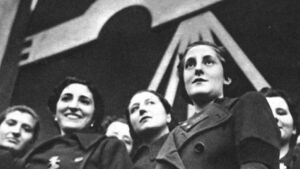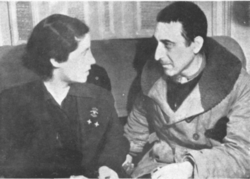Roberta II
This article is incomplete because it is pending further input from participants, or it is a work-in-progress by one author. Please comment on this article's talk page to share your input, comments and questions. Note: To contribute to this article, you may need to seek help from the author(s) of this page. |
| Roberta II | |||||||||
|---|---|---|---|---|---|---|---|---|---|
| The Functionalist Queen | |||||||||
| File:Roberta.jpeg Roberta II in 1924 | |||||||||
| Queen of Paretia | |||||||||
| Tenure | 17 July 1921 - 6 September 1934 | ||||||||
| Coronation | 17 July 1921 | ||||||||
| Predecessor | Lourenço III | ||||||||
| Successor | Position Abolished | ||||||||
| Chairwoman of the Women's Section of the PNNP | |||||||||
| Tenure | 28 April 1923 - XX XX 1934 | ||||||||
| Predecessor | Position Created | ||||||||
| Successor | Position Abolished | ||||||||
| Lady of the 7th of November Movement | |||||||||
| Tenure | 5 November 1925 - XX XX 1934 | ||||||||
| Predecessor | Position Created | ||||||||
| Successor | Position Abolished | ||||||||
| Born | 7 September 1900 Precea, Luzela | ||||||||
| Died | 6 September 1934 Precea, Luzela | ||||||||
| Spouse | Gabriel Caio | ||||||||
| Issue | 3 Prince Manuel Infante Luca Infanta Jasmim | ||||||||
| |||||||||
| House | Pavillon | ||||||||
| Father | Lourenço III | ||||||||
| Mother | Lúcia Duartes | ||||||||
| Religion | Solarian Catholic Church | ||||||||
| Military career | |||||||||
| Allegiance | |||||||||
| Years of service | 1914-1934 | ||||||||
| Rank | Marechal-general | ||||||||
Roberta II (Roberta Sofia Susana Pilar de Pavillon; 7 September 1900 - 6 September 1934), was Queen of Paretia from 1921 to 1934. She ruled the nation during the Functionalist Period of the country's history, alongside Premier Carlos Palmeira.
Roberta was the second child of Lourenço III, she became the heir after her older brother's death. She would become infatuated with functionalism in her later youth. Her father was greatly worried about his daughter, he tried to steer her away from it but he would die in 1921. She became Queen and would support the PNNP of Carlos Palmeira, eventually becoming a member of the party in 1923. She became the leader of the Feminine Section of the party.
After the 1925 election of Xulio Sousa she would organize a coup to install Palmeira and the PNNP into power. Afterwards she became a leader of the 7th of November Movement, a totalitarian functionalist government.
She would help Palmeira enact functionalist laws and reach out to functionalist nations worldwide. Calling for a "functionalist world order" in which all nations in the world are functionalist. She would become a figurehead of the government, a national symbol for the functionalist regime.
Early life
Roberta was born on September 7th 1900, and was the second child of Lourenço III, whos rule at the time saw economic prosperity in Paretia. She was born alongside her older brother and heir Américo and younger sister Teresa. Her early childhood was mainly dull, until the death of her brother to influenza in 1913, saw her rise to the title of heir. Lourenço III was worried that she would not have enough experience to become Queen of Paretia. At the time the Great Collapse, various revolutions in other nations, and the rise of functionalism was concerning to her father, and he enlisted her into military training at the age of 14, where she learned battle logistics and weapons training. She was then enrolled in a political philosophy school in 1918.
Here she learned a great deal of functionalist ideology, namely from it's early thinkers, she also is said to have read many of the works of Gaëtan de Trintignant. In 1919 she visited the royal family of Gaullica, which she was said to become very close friends with, including price Constantin III. She visited Parti Populaire rallies many times. In 1920 she was greatly supportive of their takeover of Gaullica, and began to become more and more infatuated with functionalism. Her father became greatly concerned, as he was very much an anti-functionalist, he later even was once quoted in saying he was "worried about these new radical parties, and, even more so worried about my own daughters love for them. I don't have much time left as I grow more ill by the hour, all I wish is the future of my nation will not be an authoritarian mess, especially in a world like this. But it appears I cannot help her realize this, I am greatly worried she will join them."
Lourenço III and Premier José Monteiro in 1921 began to ban functionalist and socialist literature, including from Roberta herself. She is said to have believed her father was at fault for the worsened the state of Paretia after the Great Collapse. Roberta began to listen to the speeches and read the works of Carlos Palmeira, a rising functionalist leader in Paretia, who she eventually met in 1921. Later in the year Lourenço III would die of lung cancer, and Roberta would then ascend to the throne.
Early rule and rise of PNNP
Her first year as Queen was met with changes to much of her father's work, including protection for non-Solarian Catholic churches, which was reversed, and was supported by the PNNP. She also increased Paretian troops in the country, and cracked down on independence movements in the various kingdoms. However much of her other attempts at changes were blocked the Premier José Monteiro and the ruling Civil Congress and their allies in the coalition government. The 1922 election changed things for Roberta, it saw massive growth of the rising PNNP lead by Carlos Palmeira.
Although Monteiro was replaced by Duarte Bonafacio and the Paretian National Conservative Party, Bonafacio did little to stop Roberta and her more functionalist policies. Later in 1922 she visited Functionalist Gaullica and met with King Constantin III and Minister Rafael Duclerque, both functionalists, and was stated to have asked for help in bringing functionalist victory to Paretia. Roberta II's closest friend would eventually marry Carlito Palmeira. She later ended up join the PNNP in 1923.
As part of her newfound position in politics. She would dawn a new outfit that follows the unisex clothing style of functionalist fashion, rejecting her royal outfit that she once wore. She would wear functionalist symbolism on her clothing as well.
She soon became the leader of the Feminine Section of the PNNP, and a powerful player in the party itself, as well as a close ally and friend of Palmeira. She would attempt to back the PNNP in the 1925 election, which the party was threatened by the rising Democratic Party of Paretia lead by Xulio Sousa. 1925 in Paretia became particularly violent as street brawls between the far-right and far-left became common in order to instill fear in their political enemies. The government of Bonafacio did little to stop Roberta II and Palmeria's rise.
The 1925 election however saw the PNNP narrowly defeated by the PDP and Sousa. Palmeira claimed the election was fraudulent and did not accept the results, followed by Roberta, who refused to appoint Sousa to Premier. She eventually was forced to as the Senate of Paretia was about to strip powers from the monarchy, this lead to Sousa being Premier for little less than a month, while he was Premier Roberta met with military commanders, who by then were far more pro-Palmeira. They would be able to stage a coup in order to get Palmeira into power, Roberta II would order the military to take over Precea and have Sousa and all of the members of the PDP arrested and exiled to Etruria. She would then proceed to appoint Palmeira as Premier of Paretia, in which began the creation of the functionalist state.
Pre-war functionalist rule
Roberta II would become the figurehead of the Paretian government, although must of the power of the government rested in Palmeira. The PNNP Feminine Section would expand in size greatly. The 7th of November Movement, under the Coalition Decree, would let other right-wing elements, including traditionalists, catholics, and monarchists, join their government. This lead to the expansion of the ONJ, PNNP, and Reservistas. Roberta advocated for a female section of the Reservistas be created, it would be and became known as the Pérolitas.
Roberta II became close allies with Inteior Minister Rafael Azevedo and Propaganda Minister Hèctor Clar. Clar would have Roberta II become a symbol of the government by letting her give speeches on the newly introduced television and radio broadcasts.
Roberta II would visit numerous functionalist nations after the rise of the PNNP, including Gaullica, Amathia, Blostland, and Piraea. She and Palmeira would form what they called the "Luzelese cultural alliance" with functionalist Ardesia. A close friend of Roberta II, Filipe Noronha, would be made Foreign Minister of Paretia in 1926.
Roberta II would work together with other Women's Sections of functionalist parties in Euclea and across the world.
With global tensions in Hennehouwe and South Coius growing in 1927. Roberta II would call for the creation of a "functionalist world order" saying that one day all nations of the world will be functionalist.
With the outbreak of war between Estmere and Gaullica following the Second Sakata Incident in Coius, Palmeira and the government would declare war on the Grand Alliance nations, namely Senria, Estmere, Werania, and Soravia. She would announce this in a public broadcast. This speech became Roberta II's most famous speech, known as the War Against Democracy Speech. The most well known excerpt calling to free their enemies from democracy.
"- Our brothers and sister in Gaullica call for our aide against the democratic plague. We must bring the truth to these nations, the truth of National Functionalism, we will save the Weranians, Soravians, Senrians, Estmerish from their chains, we are not at war with the people of these nations, but the democracy that infects them. God is with us, the tomorrow of the sunrise kingdom and the world will be beautiful, a tomorrow that will last millions of years. We must make sure this tomorrow is possible, the threats that our nation face will not last, our children will look back at their forefathers and see that what we do now has ensured their prosperity for beyond time. Our children and nation count on us and our allies, people of Paretia, prepare yourselves, this task must be done. War against democracy has begun."





